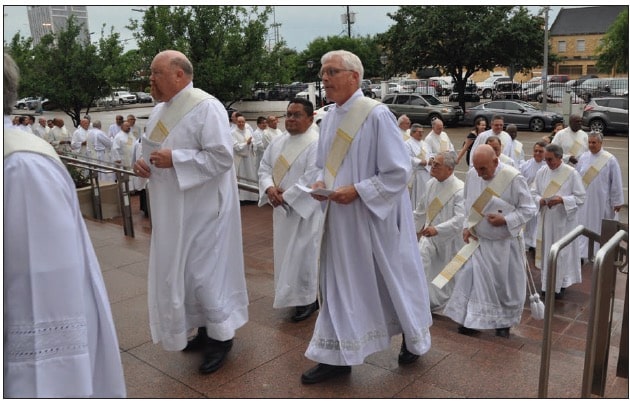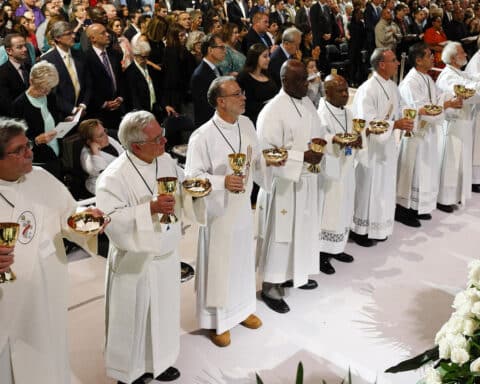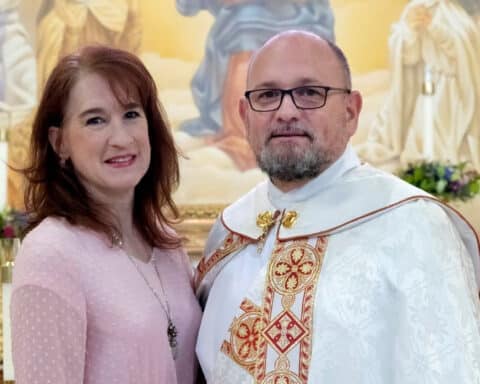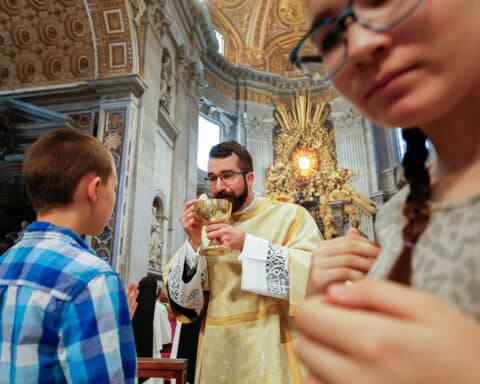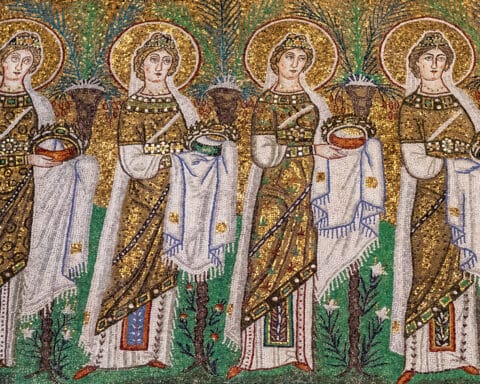Deacons, above all else, are servants. The origin of the word in Greek, diakonia, means just that — servant — and it is a role the deacons of the Church enthusiastically have fulfilled since the time of the apostles. For hundreds of years, deacon was a transitional step on the way to becoming a priest, not a permanent, lifelong ordained ministry.
While there had been an interest in restoring the permanent diaconate for centuries — even back to the Council of Trent in the 16th century — it did not gain steam until the years following World War II.
After much discussion at the Second Vatican Council (and receiving praise in the Dogmatic Constitution on the Church, Lumen Gentium), in June 1967, Blessed Pope Paul VI issued Sacrum Diaconatus Ordinem, which restored the permanent diaconate in the Latin Church.
According to this document, episcopal conferences would need to seek approval of the pope to ordain permanent deacons. In May 1968, the bishops of the United States voted to request permission from the Holy See to begin a diaconate formation program. In August, the request was approved. By the end of 1970, there were around 100 permanent deacons in the United States, and today there are more than 19,000. The diaconal ministry continues to thrive across the United States.
‘Vibrancy’ in Little Rock
Father Erik Pohlmeier is the director of faith formation and director of deacon formation for the Diocese of Little Rock, Arkansas. The diocese ordained its first class of deacons in 1981, which consisted of 16 men. The current class that is in training is the sixth class, and the largest by far.
“My explanation for the large numbers is purely the work of the Holy Spirit,” Father Pohlmeier said. “There is a vibrancy in the diocese in various ways, including our number of seminarians. We will ordain eight priests this spring. The talk of vocations throughout the diocese has made considering God’s calling a part of being Catholic in Arkansas.”
The diocese hosts various retreats, which have helped many men grow in faith “to the point of hearing and responding to a deeper call from the Lord,” Father Pohlmeier said. Before applications for the current diaconate class were accepted, a nine-month discernment program with 130 men was conducted throughout the statewide diocese. There currently are 67 aspirants.
Not only is there a trend of a thriving permanent diaconate across dioceses in the United States, in many dioceses there is an increase in the racial and ethnic diversity among deacons. This reflects an increase in diversity among the laity in the Catholic Church in the United States. The current deacon class in Little Rock is the second class that includes a Spanish-language track.
“The primary diversity of our diocese is the balance of Anglo and Hispanic Catholics,” Father Pohlmeier said. “We are roughly 50/50 in the diocese, and our bishop is clear that the Church in Arkansas must serve all Catholics.” The largest parishes have even larger percentages of Hispanic Catholics, and the pastors are grateful for the assistance of deacons and “are pleased to see the help currently in formation.”
Growth in Texas
The Archdiocese of Galveston-Houston has a growing cadre of permanent deacons, and Deacon Dominic Romaguera is grateful for the support of the archbishop, Cardinal Daniel N. DiNardo.
Deacon Romaguera is the director of admission and scrutinies for the Office of the Permanent Diaconate in the Archdiocese of Galveston-Houston, a position in which he has served for the least two years. The admission and scrutinies team addresses the inquiry stage of formation, for those seeking more information and beginning the discernment process.
A new group (or cohort) begins every two years, and there are typically 60-90 inquirers in each group. The inquiry phase covers two years, during which the candidates take courses on the Old Testament, the New Testament, the Catechism of the Catholic Church, philosophy, theology and more. This period in formation also includes a year of Saturday sessions, each of which consist of half a day of spiritual formation and half a day of pastoral formation.
The role of wives in the formation of permanent deacons is long-established and even is written into Church law. In Sacrum Diaconatus Ordinem, Paul VI wrote that when a married man pursues the diaconate, he is “not to be admitted unless there is certainty … about the wife’s consent” (No. 11). The Code of Canon Law also stipulates that the wife must consent to the ordination.
The Archdiocese of Galveston-Houston honors this respect for the wives of potential deacons by including them in the formation process. Wives are encouraged to attend the academic classes and are required to attend the Saturday sessions.
The formation process for deacons in Galveston-Houston is thorough, rooted in the tradition and patrimony of the Church and fully recognizes the profound role the wife of the deacon plays. This may have much to do with why the diaconate is thriving.
“The permanent diaconate is welcomed and growing in Galveston-Houston because of great support by our ordinary and good support by our pastors,” Deacon Romaguera said. Not just the support of these shepherds, but the formation process itself: “Our Saturday sessions are developed to focus on human, spiritual and pastoral formation,” he said. “Our Saturday sessions are geared with special sessions for the wives and couples.”
The Saturday sessions include faith-formation groups, led by mentor couples who help guide the deacons and their wives based on their own experience living this vocation. “Because of the class sizes, our mentor couples have been a valuable asset to both provide those in formation with personal touch and to provide feedback to us to assist those in formation.”
The archdiocese is very diverse. Every Sunday across the archdiocese, Masses are said in more than 17 different languages. Serving these different groups can be challenging, and the archdiocese welcomes and encourages inquirers from all cultures. The largest demand faced is for Hispanic deacons, and as such, both the academic and Saturday formation is offered in English and Spanish.
“With the help of the Holy Spirit, we are committed to forming the best deacons God has called them to be,” Deacon Romaguera said.
Paul Senz writes from Oregon.

